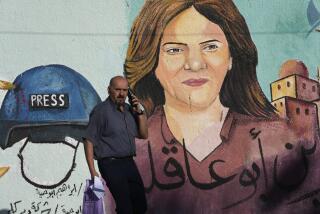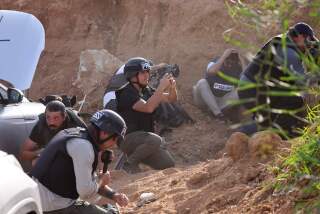Private e-mail is public
- Share via
At the core of the relentless partisan assault on the American news media’s tradition that good journalism can and should be unbiased, is a campaign to obliterate the distinction between the public and the private.
The notion here is that because journalists, like other human beings, have thoughts and opinions about the world around them, those sentiments must ultimately contaminate their journalism. According to this argument, no amount of training, no adherence to principle, no form of self-discipline is sufficient to guarantee unbiased, dispassionate reporting.
Facts may be facts, in other words, but they still have been selected by a biased mind. The only remedy is to admit that everything we call journalism is the continuation of opinion by other means. What’s required is that our media stop the hypocrisy of pretending to inform and wade into the argument with all biases blazing.
That’s the backdrop for this week’s ambiguous case of Farnaz Fassihi, the Wall Street Journal’s Middle East correspondent, currently reporting from Baghdad. The Journal’s news columns are justifiably admired for their dispassion and clarity. Fassihi’s reportage is no exception. Over the course of her assignment in Iraq, the 31-year-old Iranian-born, American-educated correspondent has been in the habit of sending monthly e-mails to some of her friends -- keeping in touch, letting them know how she’s doing. Private correspondence, in other words.
This week, one of her lengthy note’s recipients took it upon himself or herself to circulate Fassihi’s e-mail to others. Within days, it had spread across the Web, a painfully bleak and clearly heartfelt appraisal of the Iraqi morass:
“Being a foreign correspondent in Baghdad these days is like being under virtual house arrest,” she wrote. “Forget about the reasons that lured me to this job: a chance to see the world, explore the exotic, meet new people in far away lands, discover their ways and tell stories that could make a difference.
“Little by little, day-by-day, being based in Iraq has defied all those reasons. I am housebound. I leave when I have a very good reason to and a scheduled interview. I avoid going to people’s homes and never walk in the streets. I can’t go grocery shopping any more, can’t eat in restaurants, can’t strike a conversation with strangers, can’t look for stories, can’t drive in anything but a full armored car, can’t go to scenes of breaking news stories, can’t be stuck in traffic, can’t speak English outside, can’t take a road trip, can’t say I’m an American, can’t linger at checkpoints, can’t be curious about what people are saying, doing, feeling. And can’t and can’t ... “
What ‘turning point’?
Fassihi went on to write, “It’s hard to pinpoint when the ‘turning point’ exactly began.... Was it when the insurgency began spreading from isolated pockets in the Sunni Triangle to include most of Iraq? Despite Present Bush’s rosy assessments, Iraq remains a disaster. If under Saddam it was a ‘potential’ threat, under the Americans it has been transformed to ‘imminent and active threat,’ a foreign policy failure bound to haunt the United States for decades to come.”
Iraqi officials have stopped releasing civilian casualty figures, she wrote, because the “numbers are so shocking.” The insurgency, Fassihi wrote, “is growing stronger, organized and more sophisticated every day. The various elements within it -- Baathists, criminals, nationalists and Al Qaeda -- are cooperating and coordinating.... One could argue that Iraq is already lost beyond salvation. For those of us on the ground it’s hard to imagine what if anything could salvage it from its violent downward spiral.
“The genie of terrorism, chaos and mayhem has been unleashed onto this country as a result of American mistakes and it can’t be put back into a bottle.”
There is more, equally pained, equally persuasive.
Splashing this sort of stuff around the Internet is bound to cause talk, and a good bit of it occurred in the Journal’s newsroom. Wednesday, two of the paper’s staff members -- both of whom asked not to be identified -- said they had been told that Fassihi would not be allowed to write about Iraq for the paper until after the election, presumably because unauthorized publication of her private correspondence somehow called into question the fairness of her journalism.
In point of fact, no one has questioned the content of Fassihi’s reporting nor alleged that it has been in any way biased.
Was reporter sanctioned?
So was Fassihi told not to write about Iraq by WSJ editors until after Nov. 2? It seemed an easy matter to resolve, though -- as it turns out -- very little in this uneasy moment yields to easy resolution.
Paul Steiger, the Journal’s managing editor, was unavailable by phone Thursday, but his spokesman, Robert Christie, accepted a question on his behalf and agreed to put it to the editor: Had Fassihi’s e-mail been the subject of discussion among her editors and had they decided that its dissemination should prevent her from writing about Iraq until after Nov. 2?
Christie forwarded Steiger’s response by e-mail: “Ms. Fassihi is coming out of Iraq shortly on a long planned vacation. That vacation was planned to, and will, extend past the election.”
A follow-up question seemed in order and was sent to Steiger, through Christie, by e-mail: “If this correspondent wishes to write about Iraq for the Wall Street Journal, is she free to do so?”
Steiger’s reply, via his spokesman, was this: “She is going on a long-scheduled vacation outside Iraq and has no plans to work during that time.”
Fair-minded readers can make of that what they will.
The Wall Street Journal is one of the world’s great newspapers, vigorously and intelligently reported, rigorously edited and impeccable in its division between news and opinion. Farnaz Fassihi is an admirable correspondent who certainly has earned -- and perhaps, as her note suggests, needs -- a long vacation.
Still, it’s impossible to come away from all this without thinking that, like so many American journalists and news organizations, the Journal and its staff are feeling around for what used to be familiar boundaries, wondering whether they’re still there and -- if so -- precisely where.
More to Read
Sign up for Essential California
The most important California stories and recommendations in your inbox every morning.
You may occasionally receive promotional content from the Los Angeles Times.










